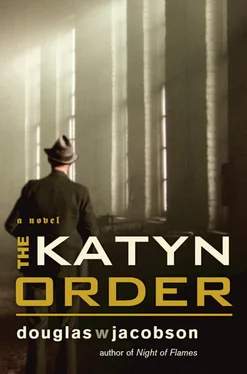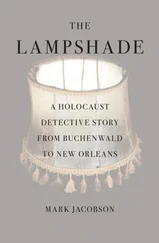After dinner they adjourned to the terrace with cigars and cognac. Despite the good-humored spirit of the evening, Adam was still edgy in the presence of the Russians. He remembered what Natalia had told him about the Russians burning her village; about the disappearance of her parents, relatives and friends; about her brother, most likely among the thousands of Polish officers murdered at Katyn and dumped into a ditch. He took a sip of cognac and watched Kovalenko and Andreyev, who were bantering easily with Whitehall. Despite his prejudice against Russians, Adam found himself rather liking Andreyev, feeling some connection with him. He decided he’d better be cautious about that.
Halfway through his second cognac, Kovalenko finally came to the point of the evening. “Gentlemen, I suggest we address the issue that brings us here tonight. I asked Captain Andreyev to see if he could find out what our NKVD friend, Dmitri Tarnov, was up to the last few years. It seems he found a rather—shall we say— intimate source.”
Andreyev set down his glass and leaned forward. “She’s a German woman who followed Tarnov around for a few years until he tired of her. Hans Frank introduced them.”
“Frank?” Whitehall exclaimed. “Tarnov had dealings with that monster?”
“A lot of dealings,” Andreyev said. “From ’39 to ’41—while Germany and Russia were allies—Tarnov traveled to Krakow on a regular basis, collaborating with Frank on the plunder of Poland. What the woman told me the other night, however, was new information.”
Adam and Whitehall exchanged glances. Kovalenko reclined in his chair, puffing on his cigar.
Andreyev continued. “As you can imagine, contact between Tarnov and Frank stopped after Germany invaded Russia in June of ’41. Tarnov returned to Moscow and took the woman with him. However, a year and a half later, in the fall of 1942, when it looked as if Germany might win, Tarnov made a secret trip to Krakow.”
Adam stared at the Russian captain in disbelief. “How the hell did he manage that?”
Andreyev smiled. “The woman said it was pretty complicated, a lot of stops at out-of-the way places and—”
“Bloody hell! He took her along?” Whitehall blurted.
Kovalenko roared with laughter. “That’s my favorite part. The son of a bitch apparently couldn’t get along without her. And then he was stupid enough not to shoot her when he finally dumped her.”
“What happened in Krakow?” Adam asked.
“According to the woman, Tarnov carried a briefcase that he never let out of his sight the entire trip,” Andreyev said. “She told me that one evening they were invited to Frank’s private quarters at Wawel Castle. Only the three of them were present, and late in the evening, after dinner and quite a few drinks, she recalled Tarnov removing a file folder from the briefcase and handing it to Frank. She asked him about it later when they were alone, and Tarnov said it was a secret document about Poland that very few people knew existed. She claimed Tarnov was always boasting about his connections and his access to high-level orders.”
“He cut a deal to save his own skin,” Whitehall muttered.
“Exactly right! The fucking traitor!” Kovalenko snapped, glaring at the other three. “And what do you suppose that document was? What do you think he gave to Frank in exchange for his personal safety if Germany defeated us?”
The group was silent as the question hung in the air.
Whitehall finally spoke up. “General, now might be a good time to tell Adam what you know about Tarnov.”
Kovalenko turned to Adam. “You don’t know whether to trust me or not, do you, Mr. Nowak.”
Adam looked him in the eye. “No, General, I don’t.”
“Fair enough, at least you’re honest. Well, you can trust me on this. Dmitri Tarnov carried out the murders at Katyn. He did it to curry favor with Commissar Beria, who happens to be his second cousin. But it didn’t work out the way Tarnov had hoped. After it was all over, Beria cut him loose, and Tarnov’s dream of a high-ranking position in the NKVD never materialized.”
Regardless of what Adam thought of Kovalenko’s trustworthiness, there was a look in the general’s eyes that left no doubt what he had just said was true. “Is there any proof?” Adam asked.
“Tarnov wasn’t acting alone, of course. This atrocity was orchestrated at the highest levels of the NKVD. Something of this magnitude required an order—probably signed by Stalin himself and the other members of the Politburo.”
Adam turned to Captain Andreyev. “You think that’s what was in the briefcase? Wouldn’t an order like that be top secret and securely locked away in the Kremlin?”
“Perhaps someone made a copy.” Whitehall chimed in. He addressed Kovalenko: “Tarnov’s woman-friend said he was always boasting about his connections. As a relative of Beria’s he’d know certain people, he’d have access to things normally above his station, wouldn’t you say, General?”
Kovalenko nodded. “It’s possible.”
Adam absently rubbed the numb, razor-thin scar on the side of his face. “Are you suggesting that Tarnov gave a copy of the Katyn Order to Hans Frank? Why would he do that? He’s NKVD. That would be committing suicide.”
“Not if he thought the Germans would win,” Andreyev said.
“Of course!” Whitehall exclaimed. “It makes perfect sense. When the graves at Katyn were discovered, Germany and Russia blamed each other for the murders. Think of the leverage Hans Frank would have had with Hitler if he possessed actual proof that the NKVD conducted the massacre. They were prisoners of war— officers, mind you—murdered in cold blood. Tarnov gave a copy of the Katyn Order to Frank in return for his protection if Germany won the war.”
“But Frank never used the information,” Adam said.
“No, he didn’t,” Andreyev responded. “Frank’s window of opportunity closed a few months later, when the tide turned and we had the Wehrmacht on the run.”
Whitehall nodded. “Quite right, by then Frank would have been preoccupied with saving his own neck—and avoiding capture by the Russians. He couldn’t have risked any connection with that order.”
“So, what did he do with it?” Andreyev asked.
“Obviously, no one knows,” Whitehall said, “not even Tarnov, who must be desperate to get it back.”
“Wait a minute,” Adam cut in. “We’re all just speculating here. The woman just said that Tarnov gave Frank a document. We don’t know for sure what it actually was.”
Kovalenko, who had been silent for the last few minutes, took two long strides to the round wicker table and grabbed the bottle of cognac to pour another drink. Waving the bottle in the air he glared at the group. “Six months ago Tarnov tore apart Hans Frank’s headquarters at Wawel Castle looking for something. And now, since this revelation about Ludwik Banach and Hans Frank, he’s ordered that all of Frank’s records be sealed, as though he’s terrified there’s something he missed. He’s obsessed with trying to find something, and I think we all know what it is.” Kovalenko filled his glass and stepped over to Adam, holding out the bottle. “You’d better have another drink, Mr. Nowak, because Dmitri Tarnov hasn’t yet found what he’s searching for… and now he’s going after your uncle.”
12 JUNE
THE NEXT DAY, Adam was summoned back to the estate in Grunewald. It was chilly and overcast, with occasional drizzling rain, a dreary day that matched Adam’s mood. He hadn’t slept well, and not just because of recurring dreams of wide-eyed corpses. Listening to Andreyev play Chopin had re-opened all the wounds of the Warsaw Rising: the hundreds of AK commandos who lost their lives, the tens of thousands of innocent civilians killed and maimed, the churches and monuments, the history, the culture of a great city… all destroyed.
Читать дальше












